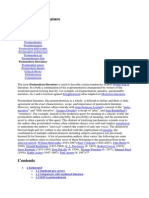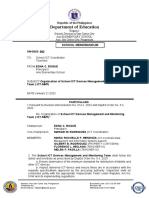What We Can Learn About ....
What We Can Learn About ....
Uploaded by
CJ LiCopyright:
Available Formats
What We Can Learn About ....
What We Can Learn About ....
Uploaded by
CJ LiCopyright
Available Formats
Share this document
Did you find this document useful?
Is this content inappropriate?
Copyright:
Available Formats
What We Can Learn About ....
What We Can Learn About ....
Uploaded by
CJ LiCopyright:
Available Formats
Achebe: Dead Mens Path
Cultural exchange:
We should not be tempted to classify Dead Mens Path as a mere illustration of a clash
of cultures, as this would be doing injustice to Achebes story. Naturally, the conflict arises
between two opposing cultures and their representatives, and at the close of the story
Michael and Nancy are left with the debris, not only of the school and gardens, but also of
Michaels career, so the questions arise whether the clash could have been avoided and
whether Achebe offers any alternatives.
The story focuses on Achebes concern with dialogue, understanding, compromise and
common sense, qualities which Michael lacks but which the Ani demonstrates. He stresses
the need for humility in people who have reaped the benefits of Western education. In
Michaels case humility and the willingness to enter into a dialogue with his antagonists
would have paved the way for a cultural exchange which, perhaps, would have enriched
both cultures.
Mimicry:
Michael Obi is the prototypical native who, by adopting and reproducing the colonizers
cultural habits and values, by becoming himself an agent of European modernization an
progress, practises mimicry. However, mimicry can be destructive for the individual and
society, as he attempts to change social mores [= customs and behaviour that are
considered typical of a particular social group or community/ Sitten und Gebruche] and
thereby often sows the seeds of his own or of his societys destruction.
On Achebes Dead Mens Path: the post-colonial era
Achebe was writing at a time when Africa was trying to shake off her colonial past and
create a new, post-colonial identity. He saw it as the duty of authors to correct the
stereotyped images of Africans created by the colonialists and to revive African pride and
dignity. This could be achieved, he thought, by reminding his fellow Africans of their own
history and traditions. He was the first African to gain international fame by writing fiction
about Africa in English and was very influential in encouraging his fellow authors to write
about African cultures.
Dead Mens Path illustrates Achebes concern with the effects of modern Western values
on traditional African society. It describes a clash between European ideas of modernity
and ancient African beliefs and warns that any attempt to bring progress to a society
must be handled with care and patience, otherwise it will fail.
The story is set in 1949, when Nigeria was still under colonial rule. The British ran the
government and the influential Mission schools, such as the one where Obi is the
headmaster. Many African writers, including Achebe, warned that the new Britisheducated black elite people like Obi would eventually take over from the colonial
rulers and might be just as bad for the country, if not worse.
The fact that Obi is the main character of the story illustrates the change in focus since the
colonial period. As part of the process of decolonizing the mind post-colonial writers like
Achebe are more interested in the indigenous peoples (Vlker) than the Europeans. In
Dead Mens Path there is only brief mention of a European, the white Supervisor who
comes to inspect the school. African characters are no longer stereotypes, but rounded
characters with psychological depth. As a consequence of this change in focus the point of
view has also shifted. Whereas colonialist writers told their stories through the eyes of
Europeans, postcolonial ones like Achebe are exclusively interested in the point of view of
their own countrymen.
From: Ziegsar: Caught between Cultures, Stuttgart (Klett) 2005, p. 126
You might also like
- Praxis Score ReportDocument3 pagesPraxis Score Reportapi-349252843No ratings yet
- PSMB Certified Trainer Curriculum StructureDocument19 pagesPSMB Certified Trainer Curriculum StructureMardinoOmarNo ratings yet
- Ihab Hassan On PostmodernismDocument2 pagesIhab Hassan On PostmodernismBeholdmyswarthyface0% (1)
- Essay On PostmodernismDocument2 pagesEssay On PostmodernismMaría Belén TarantinoNo ratings yet
- The Literature of Reason and RevolutionDocument15 pagesThe Literature of Reason and RevolutionIgor TereschenkoNo ratings yet
- Short Story AnalysisDocument3 pagesShort Story AnalysisOde Kone EgoisyaegoisNo ratings yet
- White and Pastel Teal Minimalist ResumeDocument1 pageWhite and Pastel Teal Minimalist Resumeapi-251349920No ratings yet
- Postmodern PeriodDocument2 pagesPostmodern PeriodRandy GasalaoNo ratings yet
- Postmodern PresentationDocument15 pagesPostmodern PresentationSarah BurneyNo ratings yet
- Post ModernismDocument11 pagesPost ModernismSakthi Eeswaran100% (1)
- American PostmodernismDocument20 pagesAmerican Postmodernismpbars0% (1)
- Chapter On PostmodernismDocument11 pagesChapter On PostmodernismAti SharmaNo ratings yet
- Dead MenDocument2 pagesDead MenMaikah Richport0% (1)
- 12 2 Englisch A Dead Mens PathDocument2 pages12 2 Englisch A Dead Mens PathJeanetta Jonathan100% (1)
- Postcolonial LiteratureDocument2 pagesPostcolonial Literaturejikka badilloNo ratings yet
- Unit 3: Reader-Response Criticism: A. B. C. DDocument9 pagesUnit 3: Reader-Response Criticism: A. B. C. DMayMay Serpajuan-SablanNo ratings yet
- Postmodern LiteratureDocument10 pagesPostmodern LiteraturemnazNo ratings yet
- Divisions of LiteratureDocument4 pagesDivisions of LiteratureErick Jhun Marcos Razalan100% (1)
- Rizal As Public AdministratorDocument3 pagesRizal As Public AdministratorNeil Vincent BocoNo ratings yet
- Literature TimelineDocument22 pagesLiterature TimelineBlanka Mazuch100% (1)
- Modernism: "The Avantgarde" (Noun) : The Work of Painters, Writers, Musicians and Other ArtistsDocument4 pagesModernism: "The Avantgarde" (Noun) : The Work of Painters, Writers, Musicians and Other Artistsrok modNo ratings yet
- Realism in American LiteratureDocument3 pagesRealism in American LiteraturePopescu Pompiliu-IonNo ratings yet
- Short BiographyDocument5 pagesShort BiographymtlpNo ratings yet
- FictionDocument2 pagesFictionteachenglandNo ratings yet
- Critical Lenses TheoriesDocument3 pagesCritical Lenses TheoriesChristian PepitoNo ratings yet
- American LiteratureDocument29 pagesAmerican LiteratureRowena Delos Santos AnyayahanNo ratings yet
- What Is Modernism Modernism in LiteraturDocument2 pagesWhat Is Modernism Modernism in LiteraturAyame YesungNo ratings yet
- Postmodern LiteratureDocument14 pagesPostmodern LiteratureAly Fourou BaNo ratings yet
- A Review of General Introduction To Political Communication (Brian McNair)Document12 pagesA Review of General Introduction To Political Communication (Brian McNair)Tenz BhutiNo ratings yet
- Postmodern LiteratureDocument14 pagesPostmodern Literatureapi-376795054100% (1)
- The Order of National Artist: Contemporary Philippine Arts From The RegionsDocument56 pagesThe Order of National Artist: Contemporary Philippine Arts From The Regionsshey mahilumNo ratings yet
- Historical Context Is An Important Part of Life and History, and Without It, Memories, Stories, and Characters Have Less MeaningDocument7 pagesHistorical Context Is An Important Part of Life and History, and Without It, Memories, Stories, and Characters Have Less MeaningGerome RosarioNo ratings yet
- The Myth of American AbilityDocument17 pagesThe Myth of American AbilityNurgul SaparkhojayevaNo ratings yet
- EuropeanhistoryliteratureDocument48 pagesEuropeanhistoryliteratureClaudine LabasanNo ratings yet
- Narrative Forms of Southern CommunityDocument232 pagesNarrative Forms of Southern CommunityAlexander MartNo ratings yet
- RealismDocument2 pagesRealismAnonymous 6pmKUrMTNo ratings yet
- A Rose For EmilyDocument25 pagesA Rose For Emilyii9354No ratings yet
- Postmodernism: 1.1. BackgroundDocument9 pagesPostmodernism: 1.1. BackgroundMarie StoieNo ratings yet
- Nine Common Critical Approaches To LiteratureDocument3 pagesNine Common Critical Approaches To LiteratureSheena Mae Pinoy AlmogueraNo ratings yet
- American LiteratureDocument23 pagesAmerican LiteratureJose Agurto100% (1)
- Don QuijoteDocument45 pagesDon QuijoteMaja KovačićNo ratings yet
- Nigeria and South Africa Local Government SystemDocument20 pagesNigeria and South Africa Local Government SystemOlajideAbatanNo ratings yet
- Postmodern Literature Is A Type of Literature That Came To Prominence After World War IIDocument9 pagesPostmodern Literature Is A Type of Literature That Came To Prominence After World War IIАлександр ЧечулинNo ratings yet
- Why I Want A WifeDocument6 pagesWhy I Want A WifeGiu AgNo ratings yet
- Review Trager & SmithDocument5 pagesReview Trager & SmithamirzetzNo ratings yet
- Postmodern Literature and The Question of Dehumanization in Dystopia: From The Optimistic Old To The Pessimistic NoveltyDocument14 pagesPostmodern Literature and The Question of Dehumanization in Dystopia: From The Optimistic Old To The Pessimistic Noveltychahinez bouguerra100% (1)
- PostmodernismDocument6 pagesPostmodernismDanai Acosta EmpuertoNo ratings yet
- A Modest ProposalDocument2 pagesA Modest ProposalRebecca FarruggioNo ratings yet
- Magic RealismDocument2 pagesMagic RealismassignhelpNo ratings yet
- Analysis of 1984Document4 pagesAnalysis of 1984Tanay GabhawalaNo ratings yet
- Marxist Literary CriticismDocument9 pagesMarxist Literary CriticismPHILLIT CLASSNo ratings yet
- 21st Century Report..Document10 pages21st Century Report..MJ BenedictoNo ratings yet
- Analysis of Araby (LT)Document3 pagesAnalysis of Araby (LT)Rosyi ZakariaNo ratings yet
- Analysis The Plot From Novel of Sense and Sensibility AnggiDocument14 pagesAnalysis The Plot From Novel of Sense and Sensibility AnggisondangmaydaNo ratings yet
- How Important Intercultural Communication Is? Why Is It Important?Document3 pagesHow Important Intercultural Communication Is? Why Is It Important?Iori YagamiNo ratings yet
- Notes On German ExpressionismDocument5 pagesNotes On German ExpressionismstyleformNo ratings yet
- Contemporary LiteratureDocument5 pagesContemporary LiteratureChinyere Ezeaba100% (1)
- Literary TheoryDocument2 pagesLiterary TheoryAdeniran AdetomilolaNo ratings yet
- Chinua Achebe As A Postcolonial NovelistDocument4 pagesChinua Achebe As A Postcolonial NovelistSana GulNo ratings yet
- Reading Things Fall Apart From A Postcolonial LensDocument2 pagesReading Things Fall Apart From A Postcolonial LensFAJAR NOOR mae-fa19-010100% (2)
- Things Fall Apart An AnalysisDocument21 pagesThings Fall Apart An AnalysisCristiane Slugovieski100% (3)
- Complete ThesisDocument39 pagesComplete ThesisÀ Ç K KhanNo ratings yet
- Math Rubric PDFDocument1 pageMath Rubric PDFReyzel Anne FaylognaNo ratings yet
- Teaching Philosophy StatementDocument2 pagesTeaching Philosophy Statementapi-309359459No ratings yet
- Minutes of The Meeting LAC-Code of Ethics and PhilosophyDocument4 pagesMinutes of The Meeting LAC-Code of Ethics and Philosophyrea reyesNo ratings yet
- Diass Lesson Week 3Document22 pagesDiass Lesson Week 3Chris John GaraldaNo ratings yet
- Chemistry Literature Review TopicsDocument7 pagesChemistry Literature Review Topicsea8142xb100% (1)
- Certificate: First Name SurnameDocument4 pagesCertificate: First Name Surnamechan borbonNo ratings yet
- Raj B. K. N. Rao (auth.), Raj B. K. N. Rao, A. D. Hope (eds.)-COMADEM 89 International_ Proceedings of the First International Congress on Condition Monitoring and Diagnostic Engineering Management (C.pdfDocument557 pagesRaj B. K. N. Rao (auth.), Raj B. K. N. Rao, A. D. Hope (eds.)-COMADEM 89 International_ Proceedings of the First International Congress on Condition Monitoring and Diagnostic Engineering Management (C.pdfRaj Kumar PatelNo ratings yet
- The Assure ModelDocument9 pagesThe Assure Modelpj501100% (2)
- Research ProposalDocument9 pagesResearch ProposalShyamly DeepuNo ratings yet
- Chapter 4 in Inclusive Educ.Document35 pagesChapter 4 in Inclusive Educ.marvinfuentes011402No ratings yet
- bds2013 14Document135 pagesbds2013 14Mohammed ArshadNo ratings yet
- FCE Use of EnglishDocument10 pagesFCE Use of EnglishEstefi SirenaNo ratings yet
- School Ict Devices Management and Monitoring TeamDocument2 pagesSchool Ict Devices Management and Monitoring TeamMargie RodriguezNo ratings yet
- W - 1-3 - ACCE 311 OPERATIONS AUDIT-unlocked PDFDocument72 pagesW - 1-3 - ACCE 311 OPERATIONS AUDIT-unlocked PDFDavid SalazarNo ratings yet
- Forum 9 Curriculum Implementation in SchoolsDocument9 pagesForum 9 Curriculum Implementation in SchoolsAlfredo CruzNo ratings yet
- Julio Granda ResumeDocument2 pagesJulio Granda ResumeJulio GrandaNo ratings yet
- Literature Review Fall PreventionDocument8 pagesLiterature Review Fall Preventionaflskdwol100% (1)
- Tips For A Successful Job InterviewDocument9 pagesTips For A Successful Job InterviewRoshinne Lea Ang BialaNo ratings yet
- Reference: Deped Order No. 42, S. 2016: Daily Lesson LogDocument2 pagesReference: Deped Order No. 42, S. 2016: Daily Lesson Logjanice alquizarNo ratings yet
- Assessment 2 Part 2Document3 pagesAssessment 2 Part 2AnnaNo ratings yet
- Literature MatrixDocument3 pagesLiterature MatrixJuvy IringanNo ratings yet
- (★=男性 A ★★=男性 B ☆=女性 A ☆☆=女性 B)Document9 pages(★=男性 A ★★=男性 B ☆=女性 A ☆☆=女性 B)YomoNo ratings yet
- Facts For UpdatingDocument4 pagesFacts For Updatingapi-234325459No ratings yet
- Introduction To English Banana ComDocument28 pagesIntroduction To English Banana ComKhurram ShahzadNo ratings yet
- Academic Journal Guide 2021 - Chartered Association of Business Schools1Document108 pagesAcademic Journal Guide 2021 - Chartered Association of Business Schools1Siddharth MisraNo ratings yet
- Pu Kalecki by Osiatyński VVV ImpDocument25 pagesPu Kalecki by Osiatyński VVV ImpAyush Ranjan GuptaNo ratings yet
- FM DOrSU ODI 05 Student Profile FormDocument2 pagesFM DOrSU ODI 05 Student Profile FormAijunful Tabay100% (2)

























































































